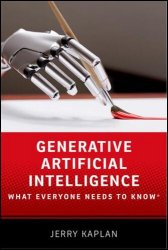Generative Artificial Intelligence: What Everyone Needs to Know
- Добавил: literator
- Дата: 24-01-2024, 18:59
- Комментариев: 0
 Название: Generative Artificial Intelligence: What Everyone Needs to Know
Название: Generative Artificial Intelligence: What Everyone Needs to KnowАвтор: Jerry Kaplan
Издательство: Oxford University Press
Год: 2024
Страниц: 241
Язык: английский
Формат: pdf (true), epub
Размер: 10.1 MB
Advances in Generative Artificial Intelligence (GAI) have created a new class of computer systems that exhibit astonishing proficiency on a wide variety of tasks with superhuman performance, producing novel text, images, music, and software by analyzing enormous collections of digitized information. Soon, these systems will provide expert medical care; offer legal advice; draft documents; write computer programs; tutor our children; and generate music and art. These advances will accelerate progress in science, art, and human knowledge, but they will also bring new dangers.
Have we finally discovered the holy grail of AI - machines that match or exceed human intelligence? Which industries and professions will thrive, and which will wither? What risks and dangers will it pose? How can we ensure that these systems respect our ethical principles? Will the benefits be broadly distributed or accrue to a lucky few? How will GAI alter our political systems and international conflicts? Are we merely a stepping stone to a new form of non-biological life, or are we just getting better at building useful gadgets?
Over the past few years, rapid advances in Machine Learning have created a new subfield of Artificial Intelligence: Generative AI. These programs produce novel text, images, music, and software by analyzing enormous collections of digitized material. (Throughout this book, as a shorthand, I will refer to such programs as “GAIs”.) But this bland description doesn’t begin to do justice to these remarkable polymaths.
The first wave of GAIs are primarily focused on engaging in natural language conversation. Called “Large Language Models” (LLMs), they already exhibit astonishing proficiency on a wide variety of tasks with superhuman performance—as well as a disturbing inclination for falsehood, illogic, and expressions of ersatz emotion, such as declaring their love for interlocutors. They chat with users in plain language and solve a broad range of complex problems with ease. Soon, LLMs will provide expert medical care, dispense legal advice, draft our documents, tutor our children, offer advice, conduct therapy, write computer programs, and manage our organizations and infrastructure. A related class of GAIs generate visual images from simple descriptions that are virtually indistinguishable from human artwork or photographs. Still other applications fabricate voices or compose music in the style of a given artist or musician. Perhaps the most intriguing of these programs are called multimodal, because they integrate diverse forms of information (linguistic, visual, sound, etc.) to understand and reason about the world. (As a demonstration, a prototype multimodal system was able to plan a meal based on a picture of the interior of a refrigerator.)
But this is just the start of the GAI revolution. The technology underlying GAIs is quite general, in the sense that these programs are capable of learning from any collection of data that can be gathered and prepared for processing—a relatively straightforward task in the modern digital world. And properly configured and authorized, they will be able to take action on our behalf.
The Chapter 2 explains Large Language Models (LLMs), which are GAIs that generate responses to questions or prompts in plain language. LLMs use specialized neural networks called “Transformers” to train on large collections of natural language text. It explores the concept of “embeddings”—vector representations of words that capture their meaning. LLMs demonstrate intelligent behavior by leveraging the semantic relationships captured in word embeddings. It also provides an overview of artificial neural networks, tokens, emergent properties, jailbreaking, and hallucinations. It concludes with a discussion of the use of Generative Adversarial Networks to create images, and potential future proficiencies of GAIs.
Generative Artificial Intelligence: What Everyone Needs to Know equips readers with the knowledge to answer these pressing questions.
"AI expert Jerry Kaplan explains how generative AI will revolutionize virtually every human activity. Highly recommended." - Francis Fukuyama, Political scientist and author of The End of History and the Last Man
Скачать Generative Artificial Intelligence: What Everyone Needs to Know
Внимание
Уважаемый посетитель, Вы зашли на сайт как незарегистрированный пользователь.
Мы рекомендуем Вам зарегистрироваться либо войти на сайт под своим именем.
Уважаемый посетитель, Вы зашли на сайт как незарегистрированный пользователь.
Мы рекомендуем Вам зарегистрироваться либо войти на сайт под своим именем.
Информация
Посетители, находящиеся в группе Гости, не могут оставлять комментарии к данной публикации.
Посетители, находящиеся в группе Гости, не могут оставлять комментарии к данной публикации.
